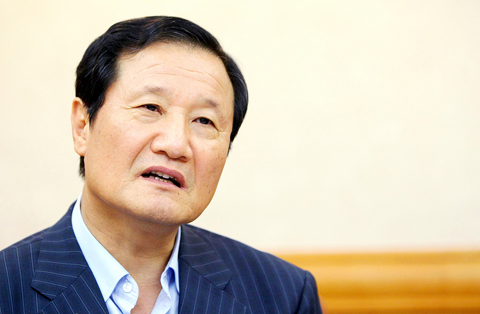The global economy will likely avoid sliding back into crisis despite Europe’s debt problems and uncertainty over the US and Chinese economies, South Korea’s finance minister said yesterday.
“The global recovery ... now stays on its upward cycle and I believe that it will not likely face a double dip down the road,” Yoon Jeung-hyun told Yonhap news agency.

PHOTO: EPA/YONHAP
Financial policymakers and central bankers will gather today for a two-day conference hosted by the IMF and South Korea in Daejeon, south of the capital Seoul.
The agenda will include discussions on the future of economies in the Asia-Pacific region and their role in preparing for the post-crisis era.
Yoon said the momentum of recovery could be undercut by Europe’s debt problems and uncertainties over recovery in the US and Chinese economies.
However, he said that the economy was expected to continue “its normalization process toward the pre-crisis level with little chances of falling into a recession.”
The IMF’s latest economic forecast for this year, released last week, is for growth of 3.3 percent in the US, the world’s biggest economy, 9.2 percent in developing Asia and just 1 percent in the eurozone.
Yoon also dismissed reports that a proposed tax on the world’s largest banks to curb excessive financial risk-taking, which has been discussed by the G20 major economies, might have to be ditched because of differences.
“The issue is being discussed very actively among member countries,” Yoon said.
“Global cooperation can be kept alive if things are maintained within the standards,” he said, adding the views of each nation would be sought in time for the G20 meeting in Seoul in November.
However, for eurozone, the latest chapter in the debt crisis will be “stress tests” of European banks to determine if they can withstand a major shock like the default of a key debtor or another serious economic downturn.
Tests of 91 banks, accounting for 65 percent of the European banking system, are to be released on July 23 amid hopes they will ease tensions on markets where many investors fear the banks may have hidden some of their problems under the carpet.

MORE VISITORS: The Tourism Administration said that it is seeing positive prospects in its efforts to expand the tourism market in North America and Europe Taiwan has been ranked as the cheapest place in the world to travel to this year, based on a list recommended by NerdWallet. The San Francisco-based personal finance company said that Taiwan topped the list of 16 nations it chose for budget travelers because US tourists do not need visas and travelers can easily have a good meal for less than US$10. A bus ride in Taipei costs just under US$0.50, while subway rides start at US$0.60, the firm said, adding that public transportation in Taiwan is easy to navigate. The firm also called Taiwan a “food lover’s paradise,” citing inexpensive breakfast stalls

TRADE: A mandatory declaration of origin for manufactured goods bound for the US is to take effect on May 7 to block China from exploiting Taiwan’s trade channels All products manufactured in Taiwan and exported to the US must include a signed declaration of origin starting on May 7, the Bureau of Foreign Trade announced yesterday. US President Donald Trump on April 2 imposed a 32 percent tariff on imports from Taiwan, but one week later announced a 90-day pause on its implementation. However, a universal 10 percent tariff was immediately applied to most imports from around the world. On April 12, the Trump administration further exempted computers, smartphones and semiconductors from the new tariffs. In response, President William Lai’s (賴清德) administration has introduced a series of countermeasures to support affected

CROSS-STRAIT: The vast majority of Taiwanese support maintaining the ‘status quo,’ while concern is rising about Beijing’s influence operations More than eight out of 10 Taiwanese reject Beijing’s “one country, two systems” framework for cross-strait relations, according to a survey released by the Mainland Affairs Council (MAC) on Thursday. The MAC’s latest quarterly survey found that 84.4 percent of respondents opposed Beijing’s “one country, two systems” formula for handling cross-strait relations — a figure consistent with past polling. Over the past three years, opposition to the framework has remained high, ranging from a low of 83.6 percent in April 2023 to a peak of 89.6 percent in April last year. In the most recent poll, 82.5 percent also rejected China’s

PLUGGING HOLES: The amendments would bring the legislation in line with systems found in other countries such as Japan and the US, Legislator Chen Kuan-ting said Democratic Progressive Party (DPP) Legislator Chen Kuan-ting (陳冠廷) has proposed amending national security legislation amid a spate of espionage cases. Potential gaps in security vetting procedures for personnel with access to sensitive information prompted him to propose the amendments, which would introduce changes to Article 14 of the Classified National Security Information Protection Act (國家機密保護法), Chen said yesterday. The proposal, which aims to enhance interagency vetting procedures and reduce the risk of classified information leaks, would establish a comprehensive security clearance system in Taiwan, he said. The amendment would require character and loyalty checks for civil servants and intelligence personnel prior to